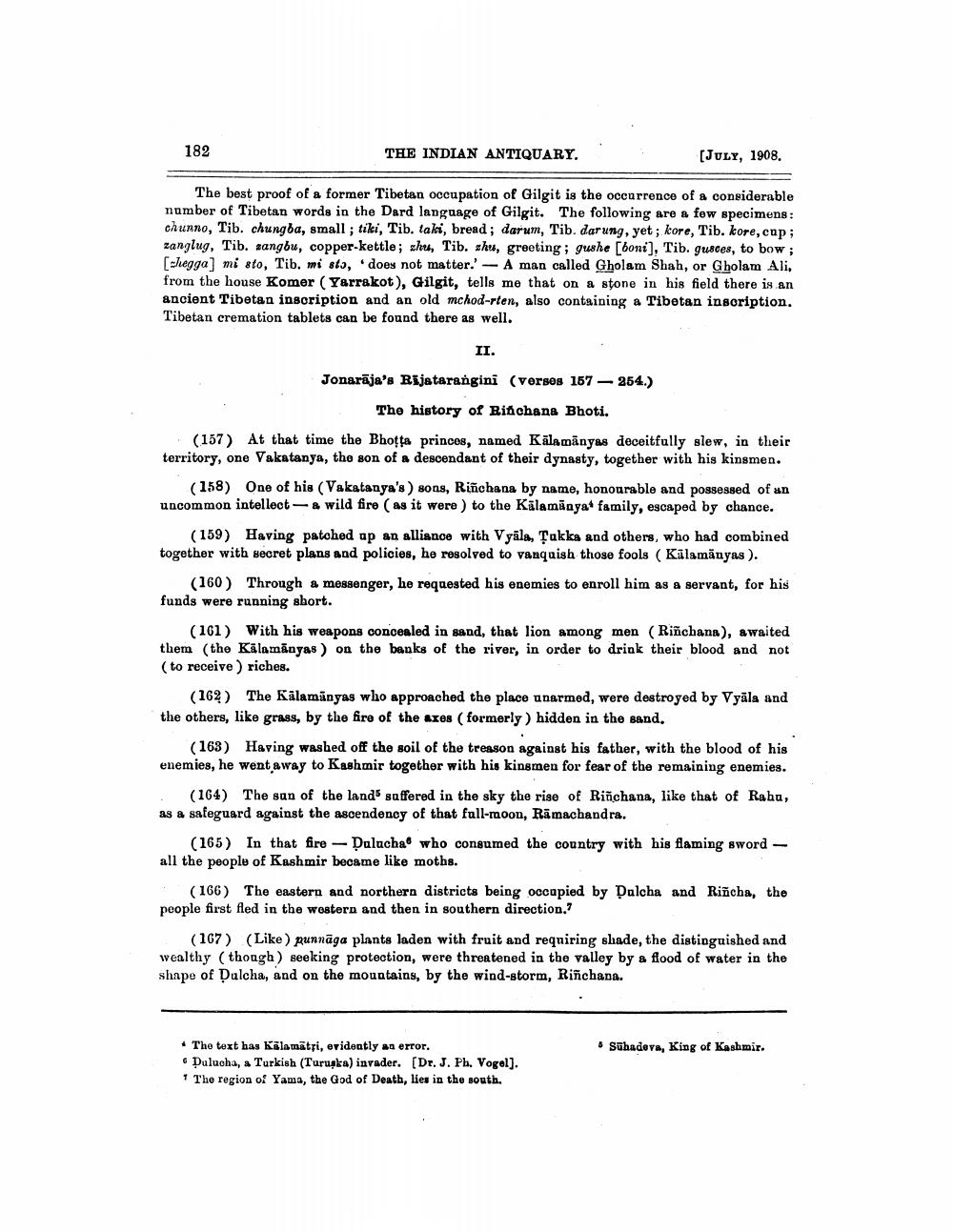________________
182
THE INDIAN ANTIQUARY.
[JULY, 1908.
The best proof of a former Tibetan occupation of Gilgit is the occurrence of a considerable number of Tibetan words in the Dard language of Gilgit. The following are a few specimens: chunno, Tib. chungba, small; tiki, Tib. taki, bread; darum, Tib. darung, yet; kore, Tib. kore, cup; zanglug, Tib. sangbu, copper-kettle; zhu, Tib. zhu, greeting; gushe [boni], Tib. gusces, to bow; [hegga] mi sto, Tib. mi sto, does not matter.' -A man called Gholam Shah, or Gholam Ali, from the house Komer (Yarrakot), Gilgit, tells me that on a stone in his field there is an ancient Tibetan inscription and an old mchod-rten, also containing a Tibetan inscription. Tibetan cremation tablets can be found there as well.
-
II.
Jonaraja's Rijatarangini (verses 157
The history of Rinchana Bhoti.
(157) At that time the Bhotta princes, named Kalamanyas deceitfully slew, in their territory, one Vakatanya, the son of a descendant of their dynasty, together with his kinsmen.
254.)
-
(158) One of his (Vakatanya's) sons, Riñchana by name, honourable and possessed of an uncommon intellect a wild fire (as it were) to the Kalamanya family, escaped by chance.
(159) Having patched up an alliance with Vyala, Takka and others, who had combined together with secret plans and policies, he resolved to vanquish those fools (Kälamanyas).
(160) Through a messenger, he requested his enemies to enroll him as a servant, for his funds were running short.
(161) With his weapons concealed in sand, that lion among men (Riñchana), awaited them (the Kalamanyas) on the banks of the river, in order to drink their blood and not (to receive) riches.
(162) The Kalamanyas who approached the place unarmed, were destroyed by Vyāla and the others, like grass, by the fire of the axes (formerly) hidden in the sand.
(163) Having washed off the soil of the treason against his father, with the blood of his enemies, he went away to Kashmir together with his kinsmen for fear of the remaining enemies.
(164) The sun of the lands suffered in the sky the rise of Rinchana, like that of Rahu, as a safeguard against the ascendency of that full-moon, Ramachandra.
(165) In that fire - Dulucha who consumed the country with his flaming swordall the people of Kashmir became like moths.
(166) The eastern and northern districts being occupied by Dalcha and Rincha, the people first fled in the western and then in southern direction."
The text has Kalamätri, evidently an error.
• Dulucha, a Turkish (Turuska) invader. [Dr. J. Ph. Vogel]. The region of Yama, the God of Death, lies in the south.
(167) (Like) punnaga plants laden with fruit and requiring shade, the distinguished and wealthy (though) seeking protection, were threatened in the valley by a flood of water in the shape of Dulcha, and on the mountains, by the wind-storm, Riñchana.
Sühadeva, King of Kashmir.




